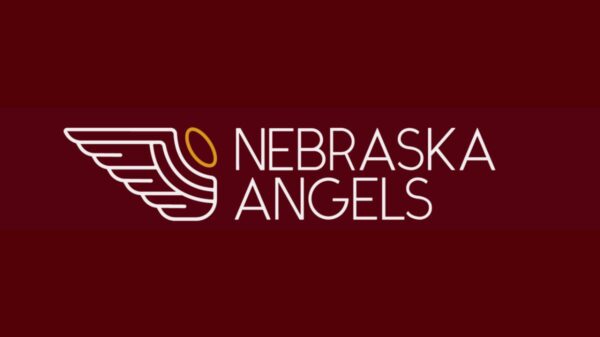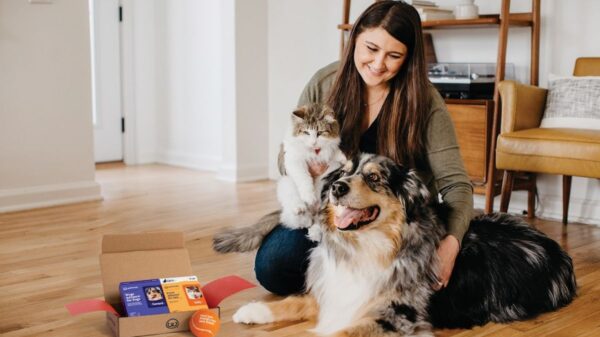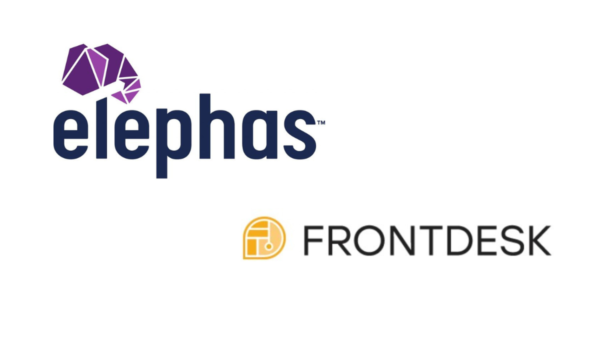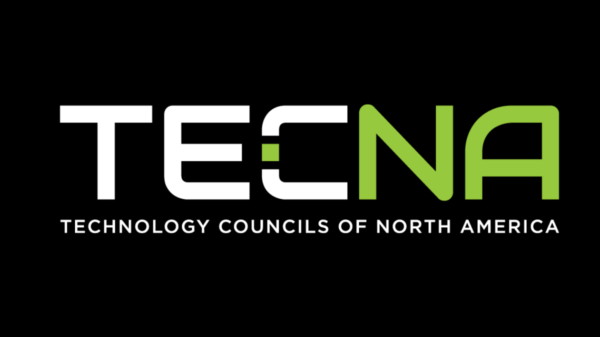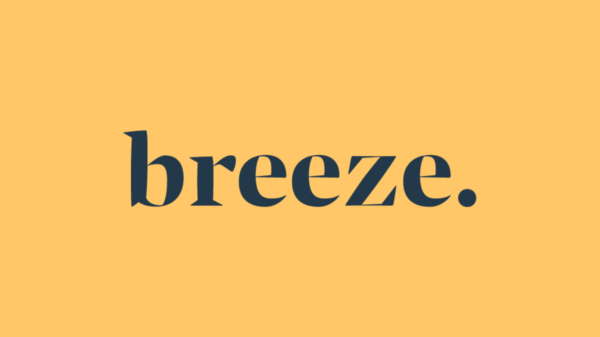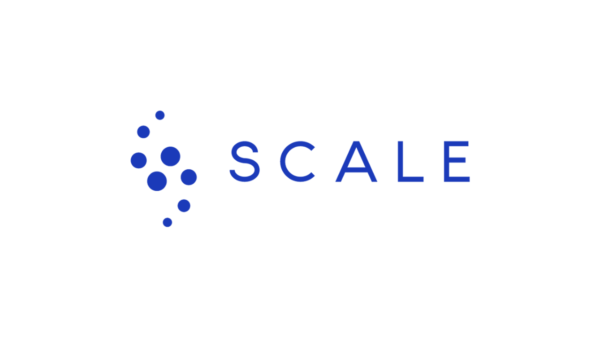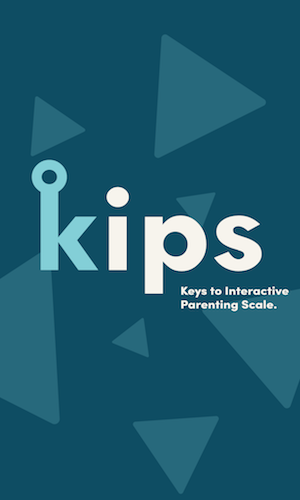Teaching is hard. It doesn’t pay well. It’s challenging work. Through the pandemic, we have seen teachers go above and beyond to ensure students get the best education whether virtually or with masks on. Parents trust teachers as partners to teach and develop their children. The new startup, Alpaca, is on a mission to ensure teachers feel valued by the parents at their schools and are treated as professionals. They give parents easy ways to support their teachers by creating a subscription program where parents can make a monthly payment and teachers receive a care package every month.
“We need teachers. As parents, we learned during the pandemic, we cannot educate our children alone. We don’t have the education, resources and sometimes patience to teach our kids. Teachers know how to do this in a way that we don’t. It’s complicated with teacher pay, teacher’s supplies and most parents think it’s so difficult and they don’t want to deal with the district, but we need to make sure teachers feel supported. If we can be partners to teachers rather than think that teachers are always going to be there. It’s a partnership. Not a deserved service,” said founder, Karen Borchert.
Founder, Karen Borchert, originally got her degree in education. She wanted to be an English teacher but ended up on an entrepreneurial path after graduating. After helping both non-profits and tech companies scale, she realized the importance of cultivating communities. Over the pandemic, she realized it was now or never to start a venture on her own. She returned to her passion of education. As an OPS mother of three, she understands the hardships that teachers have faced, especially over the last few years. With an increasingly smaller pool of people doing an even harder job, she hopes that Alpaca can make an impact for teachers and their well-being as well as the educational experience for children.
“I had a twitter moment when I was like – there’s no more excuses. There was a terrible video on twitter at a hockey game. At halftime, the entertainment, they laid out a blanket with hundreds of thousands of dollar bills and the teachers were surrounding it. They had a certain amount of time that teachers could stuff dollars in their pockets, crawling over the ice. I was appalled by that video, that this was entertainment and that teachers were willing to do it. It made me mad and sad on so many levels. That was the moment that I was like let’s go. We don’t expect that behavior in any other profession. Teachers are treated as charity cases and not as professionals. You’d never ask that of a lawyer or any other professional to get the support you need for your job. It’s a tough thing to reconcile,” said Borchert.
Alpaca’s goal is to treat teachers as the professionals they are rather than charity cases. For them, this means working as a for-profit entity. Education requires a lot of different solutions. It will require things at a district level, non-profit space and market solutions. Alpaca chose to be for-profit because it aligns with their audience. They provide a professional solution and a market solution. They don’t want teachers to have to rely on foundation funding.
“In a lot of ways, parents buy the opportunity of convenience. Yes, please take $10 a month and get teachers something. Parents don’t know how to help but are willing to pay. We work directly with teachers. Teachers pick what every teacher will get. Teachers don’t necessarily need another coffee mug. They will feel appreciated every single month versus just on teacher appreciation day. It allows us to get the kind of bulk partnerships we need and allows us to get sponsored gifts in our packs,” said Borchert.
Alpaca not only brings joy to teachers, but fosters relationships with the parents. Rather than selling cookie dough or spending time to raise money for teachers, all they need to do is subscribe to Alpaca. Denise Powell is a parent and a member of the Parent Teacher Organization at Western Hills Magnet Elementary in OPS. After the first few schools were using Alpaca, word of mouth spread to the teachers at Western Hills who asked Powell to look into it. Alpaca worked with the school to do research on what those teachers wanted and needed in their classrooms.
“The feedback from teachers has been amazing. Usually, there is one week a year for teacher appreciation. Depending on your budget, you’re kind of just pulling things together that may be fun but aren’t necessarily what the teachers want or need. The good thing about Alpaca is that they did the research to thoughtfully package goods that include supplies that teachers have identified are important to them. Alpaca day is the best day of the month. The principal is going around to all of the teachers to drop off the packages. The past few years have been awful and this is a tiny way to show appreciation for them and what they do,” said Powell.
One of Alpaca’s core commitments is to listen to teachers. Whenever they start at a new school, they meet with the principal to hear their unique needs. Every school has a different culture: the families, the neighborhoods, and the teachers. They survey every teacher and ask questions on what teachers spend their own money on and what they need more of or less of. They identify what brands they love or don’t love. Teachers spend approximately $700-1200 a year on school supplies.
“What are they buying and what can’t they get? Is it stuff for your students? For yourself? For the classroom decor? We start there and build a style profile for each profile. How many teachers are there? There’s some schools that get lots of student supplies like papers and crayons but some schools don’t provide that for teachers. So teachers are buying their own expo markers or Post-it notes or things to grade papers. There’s also schools that didn’t supply masks and some schools did. This helps us tailor the packs to each school,” said Borchert.
Alpaca works directly with classroom teachers and former teachers. They intentionally craft packs to alleviate the costs for teachers. The feedback from teachers is reported back to the principal. Listening to teachers doesn’t just help Alpaca, but helps parents.
“We sent the report back to one principal and she thought it was so helpful and asked if they could send it out to the parents. So she did. On the list, they had at the bottom of the list, cold weather gear. One parent reached out to the principal and said she saw the survey data. She asked, ‘What’s up with the three teachers buying cold weather gear?’ The principal said that kids show up without hats and gloves so some teachers keep that in their classroom. That parent asked if Alpaca was going to do something but we are focused on teachers. A week later, a huge box of hats and gloves showed up at the school that parents organized and got together. Parents just sometimes don’t know the information that we are funding. It created a connection between the principal, the teachers and the parents that is so valuable,” said Borchert.
The data and information that Alpaca has the ability to collect is part of their goal to create a community where teachers and parents speak to each other. Oftentimes, parents rely on their kids to get access to information from teachers. This goal allows parents to be better advocates and partners for teachers. Alpaca lets parents know what teachers are receiving along with stories of teachers as professionals.
“I have learned the most from going to schools and learning a bit about the teacher’s world. I am asking questions about the experience of teaching. What drives teachers, what makes them excited? What’s the most difficult thing right now? The classroom is their workplace. Teachers use their money to create a place that is wonderful for them, their students to ensure that they belong in the classroom and are safe. They are professionals and want to create a place that they want to teach every day. One teacher said their classroom is their sanctuary – where they do the work they are meant to do,” said Borchert.
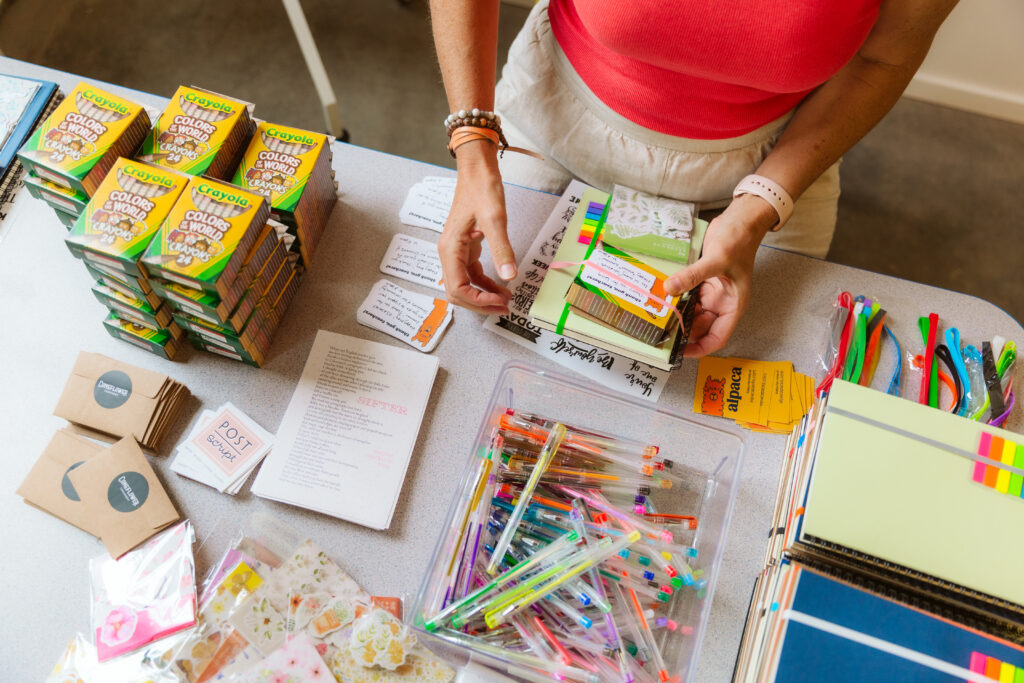
Alpaca tries to pack as much value as they can into each box. They partner with local businesses such as Coneflower Creamery and Post Script and promote those companies as sponsors and partners in the Alpaca mission. For parents that want to be supportive, they can go a step further than subscribing. Alpaca hosts pack out days where parents and community members can help to pack up the supplies and write thank you notes. Every month, corporate groups, friend groups, or parent groups can help by signing up to help.
“The Alpaca team is so thoughtful, every detail, even as deep as how it is packaged. Every month, this delivery is thoughtfully curated and beautiful with a handwritten note. That’s what makes it so special. That is a testament to their team in how much care and love is behind this idea. Every little thing is thought of and executed. Every package is packed with love,” said Powell.
With a new school year just around the corner, Alpaca is ramping up for a big year. Parents can head to their website, look for their school, and choose how much they would like to subscribe. All of the money donated by a parent stays within their school. If a school has not yet been nominated for the Alpaca program, parents can nominate them by telling Alpaca a bit about the school. Their hopes are to be up to 10-20 schools by October. By nominating a school, Alpaca is able to see where parents are excited to support it and shows them where to go next. Every school in Omaha, whether public or private, is open to nominate.
Teachers are an essential part to the development of children. They deserve to feel respected and valued by parents, administrations, and their community. Alpaca is on a mission to ensure that they are treated in the professional manner that they deserve.
To learn more, head Alpaca’s website or follow them on Twitter (@alpacapacks), Instagram (@_alpacaapacks), or Facebook (@alpacapacks).

